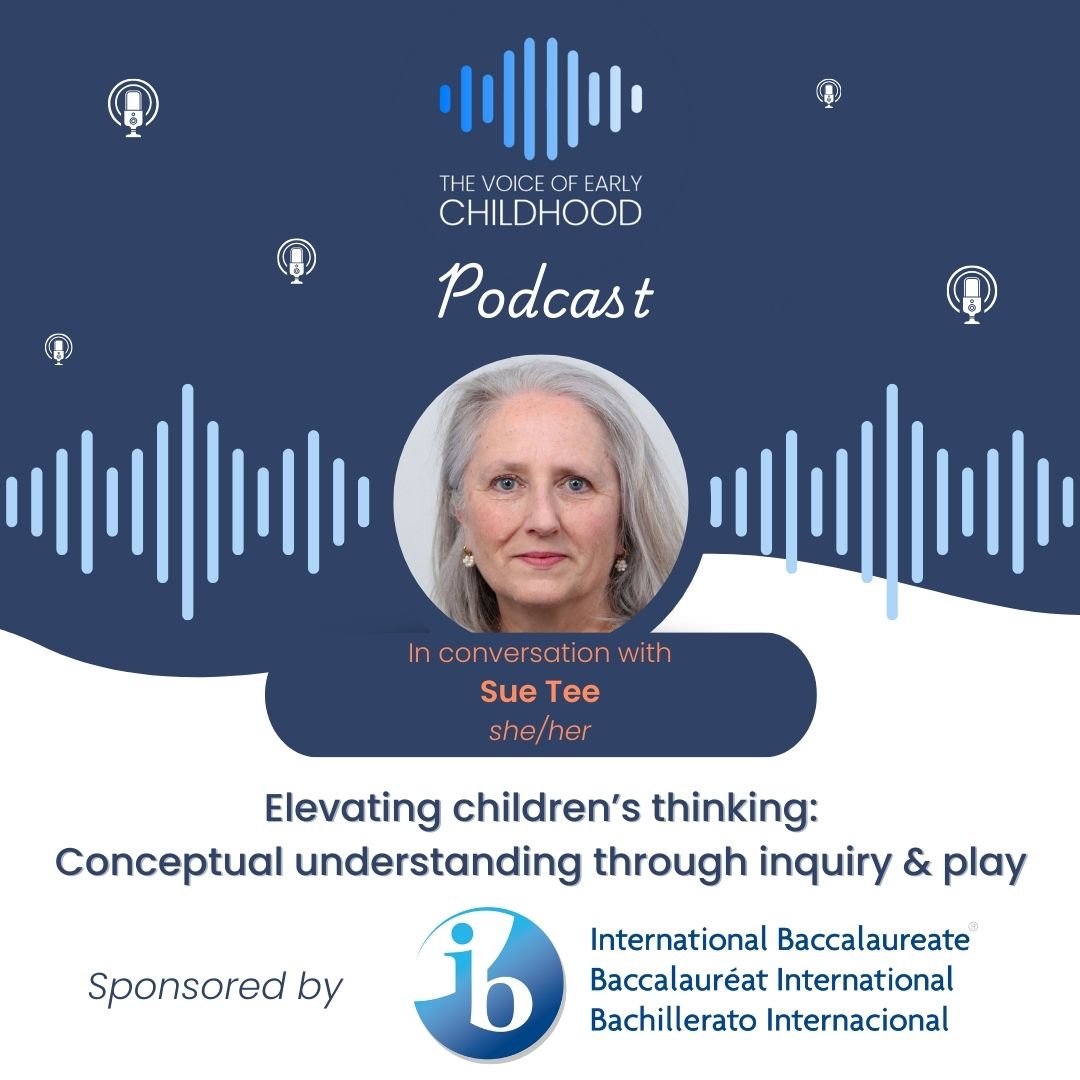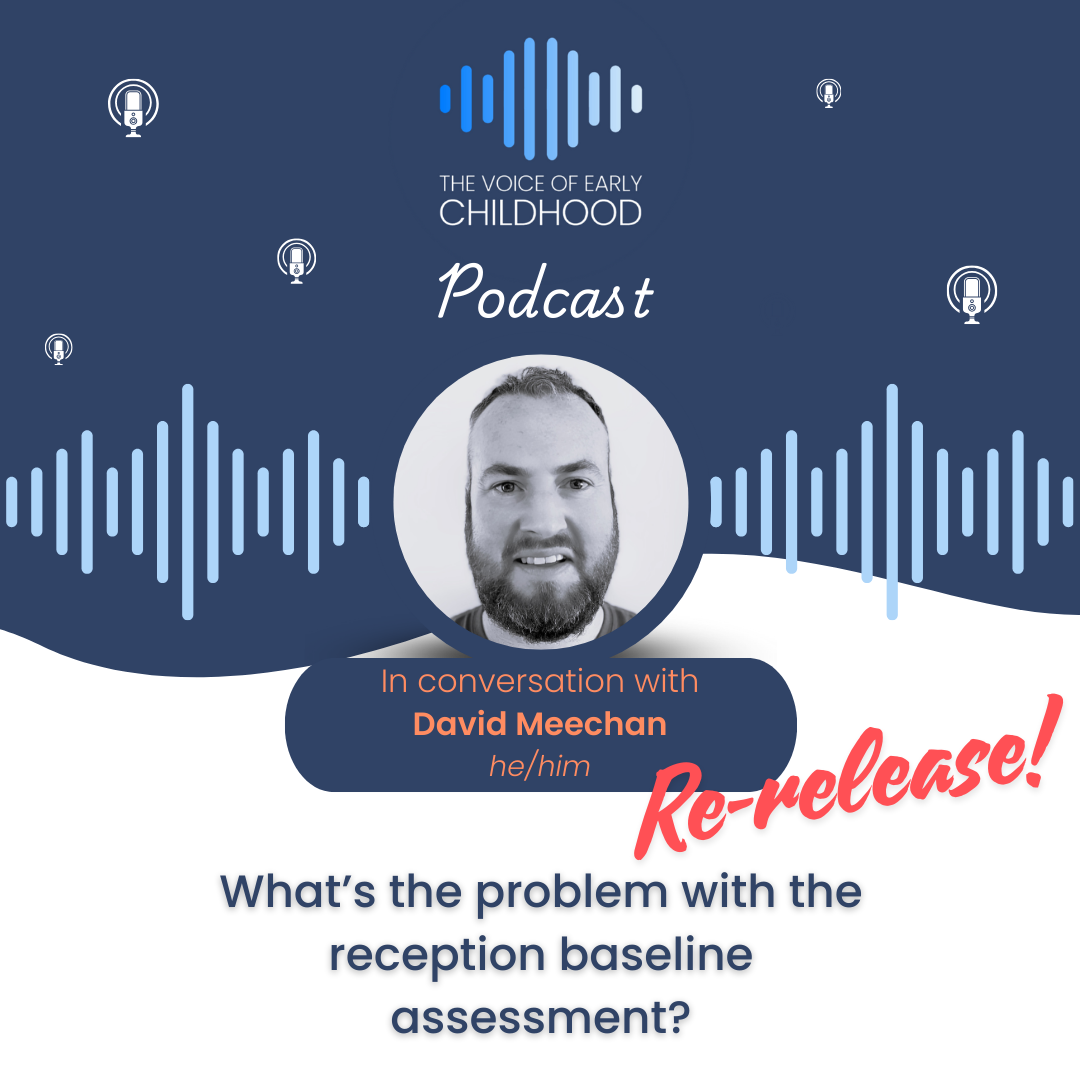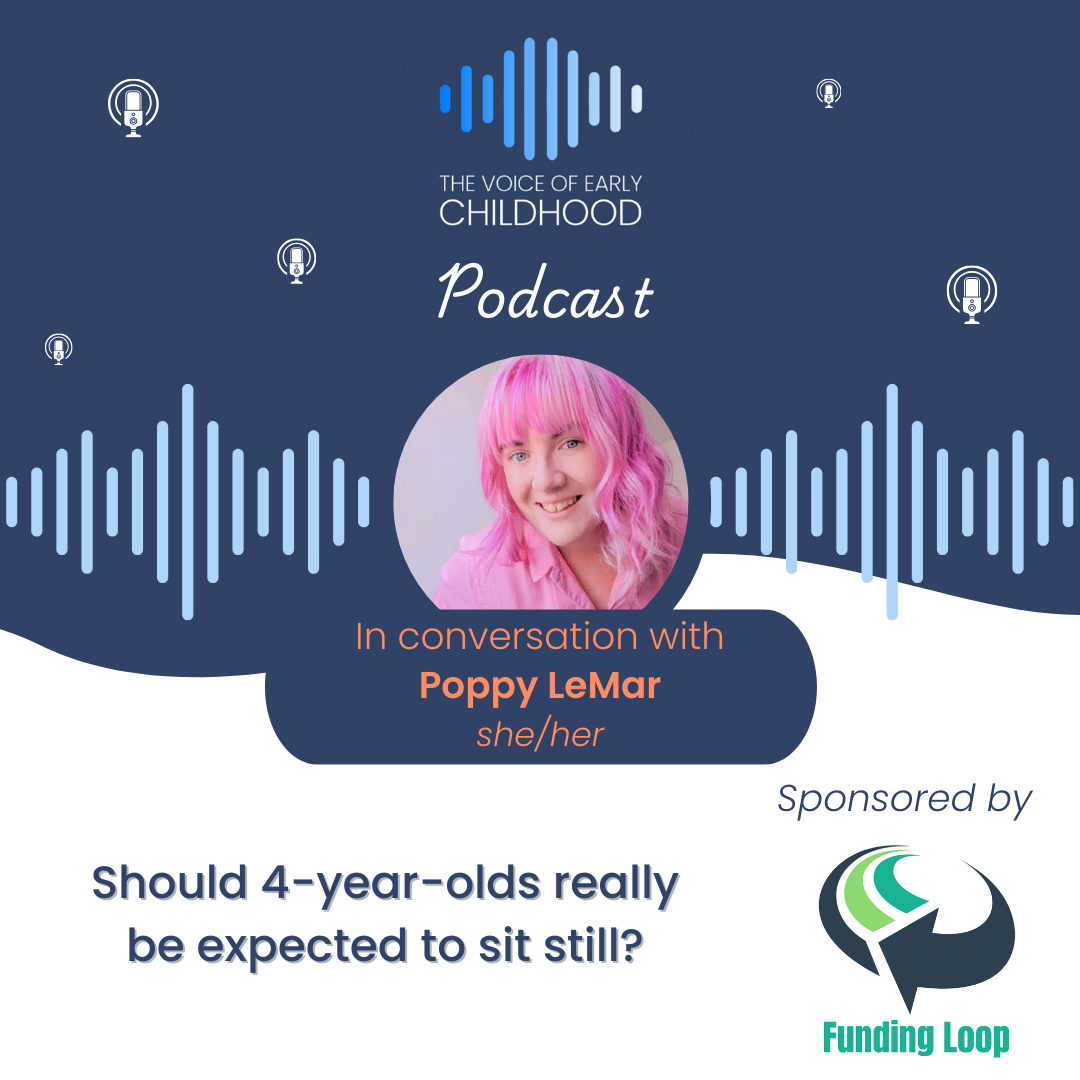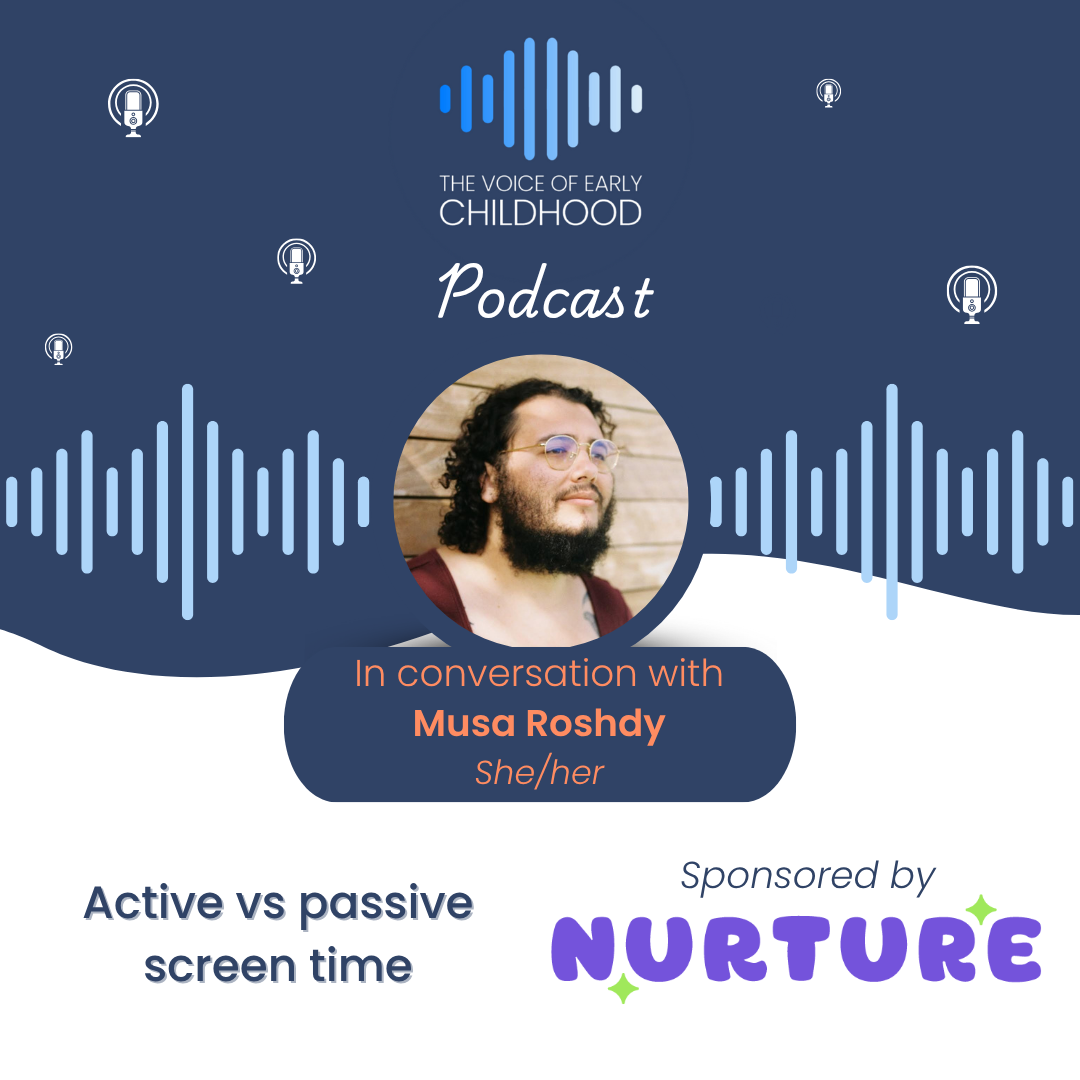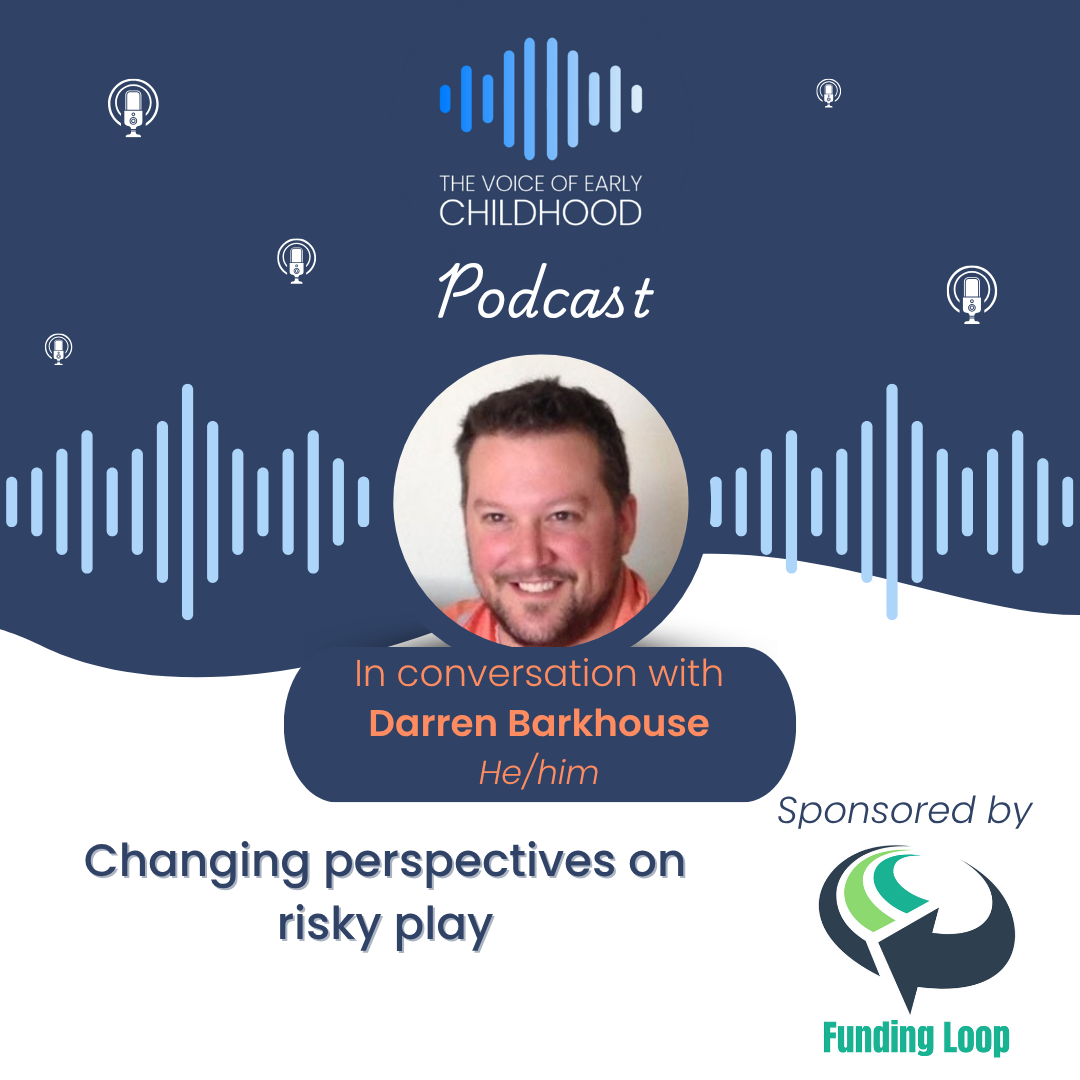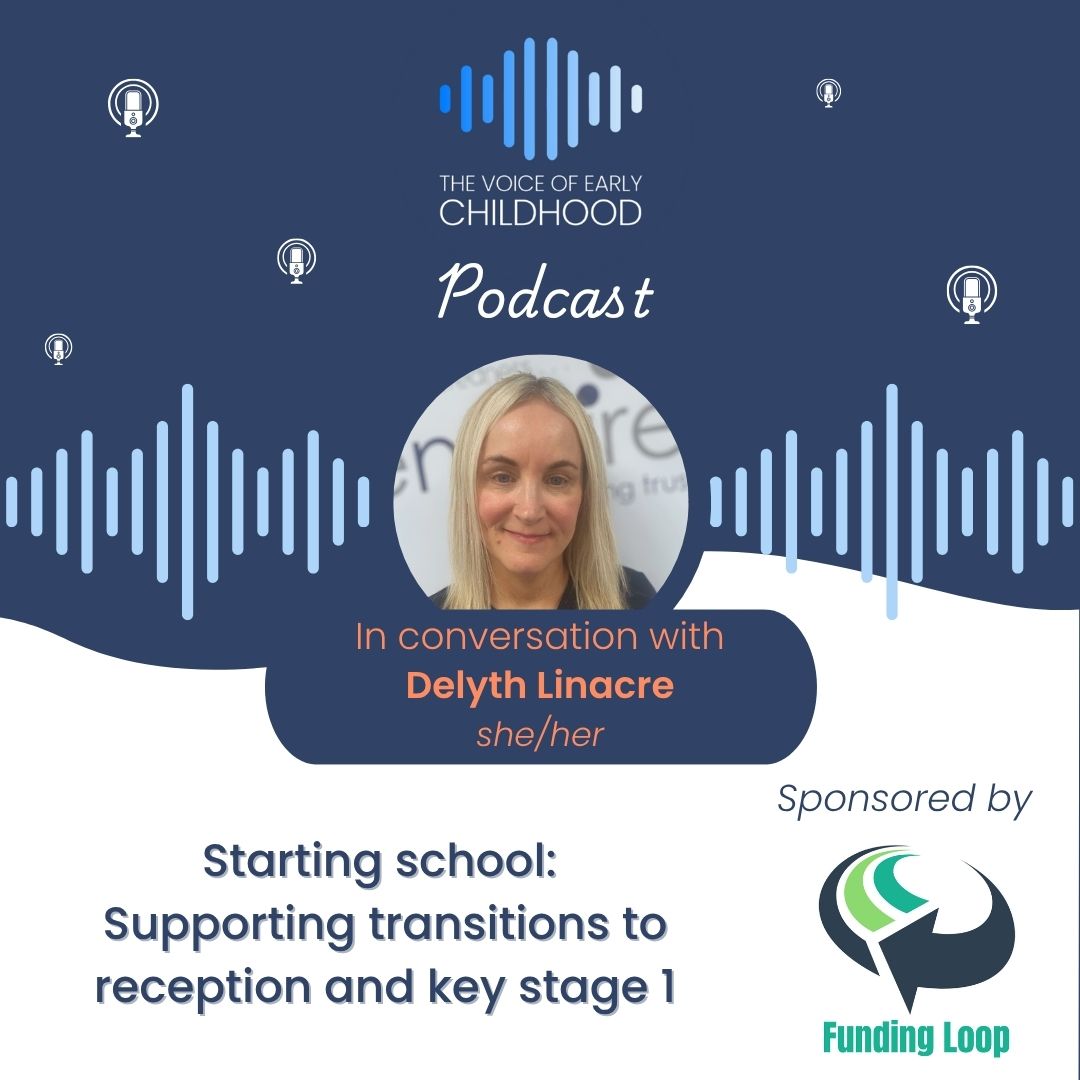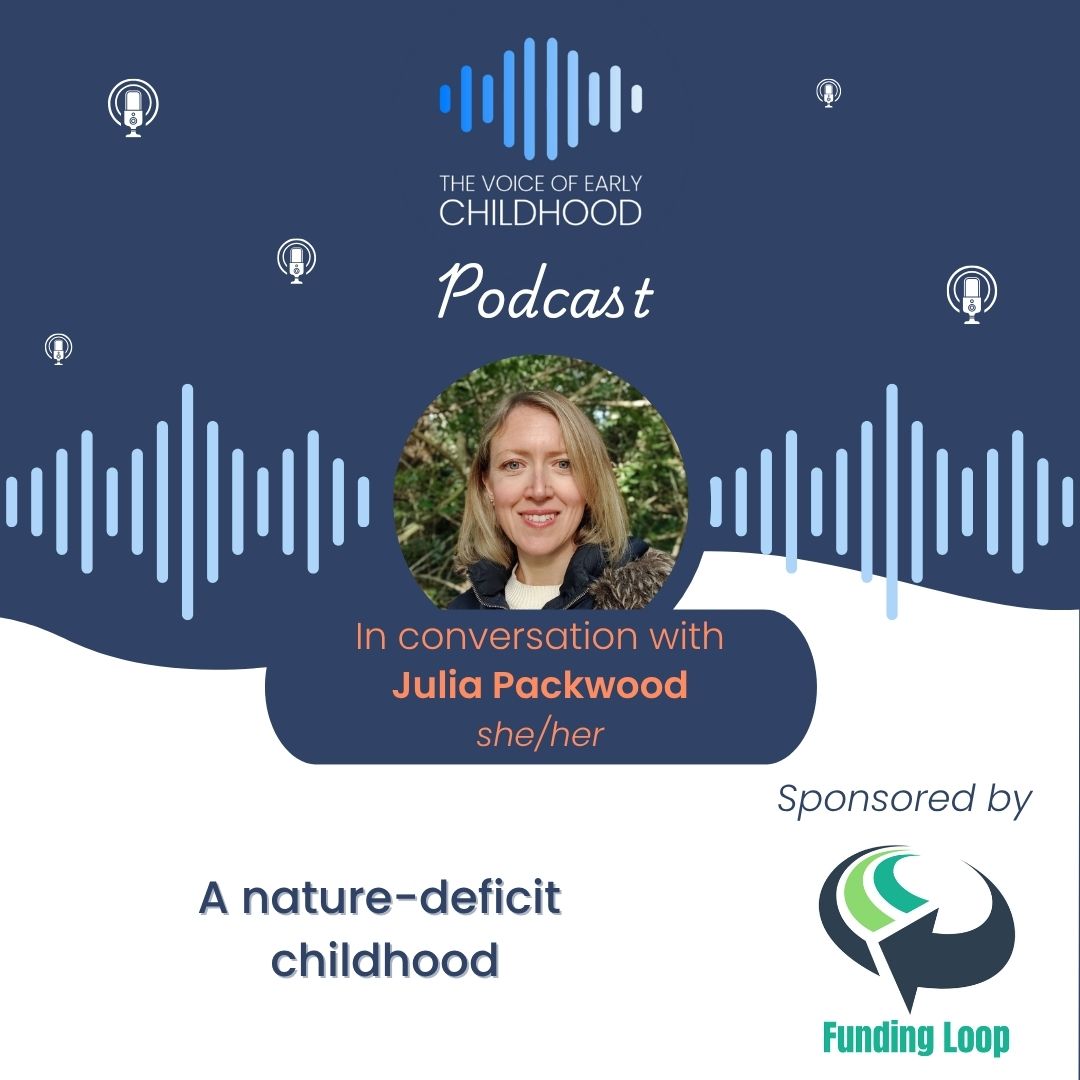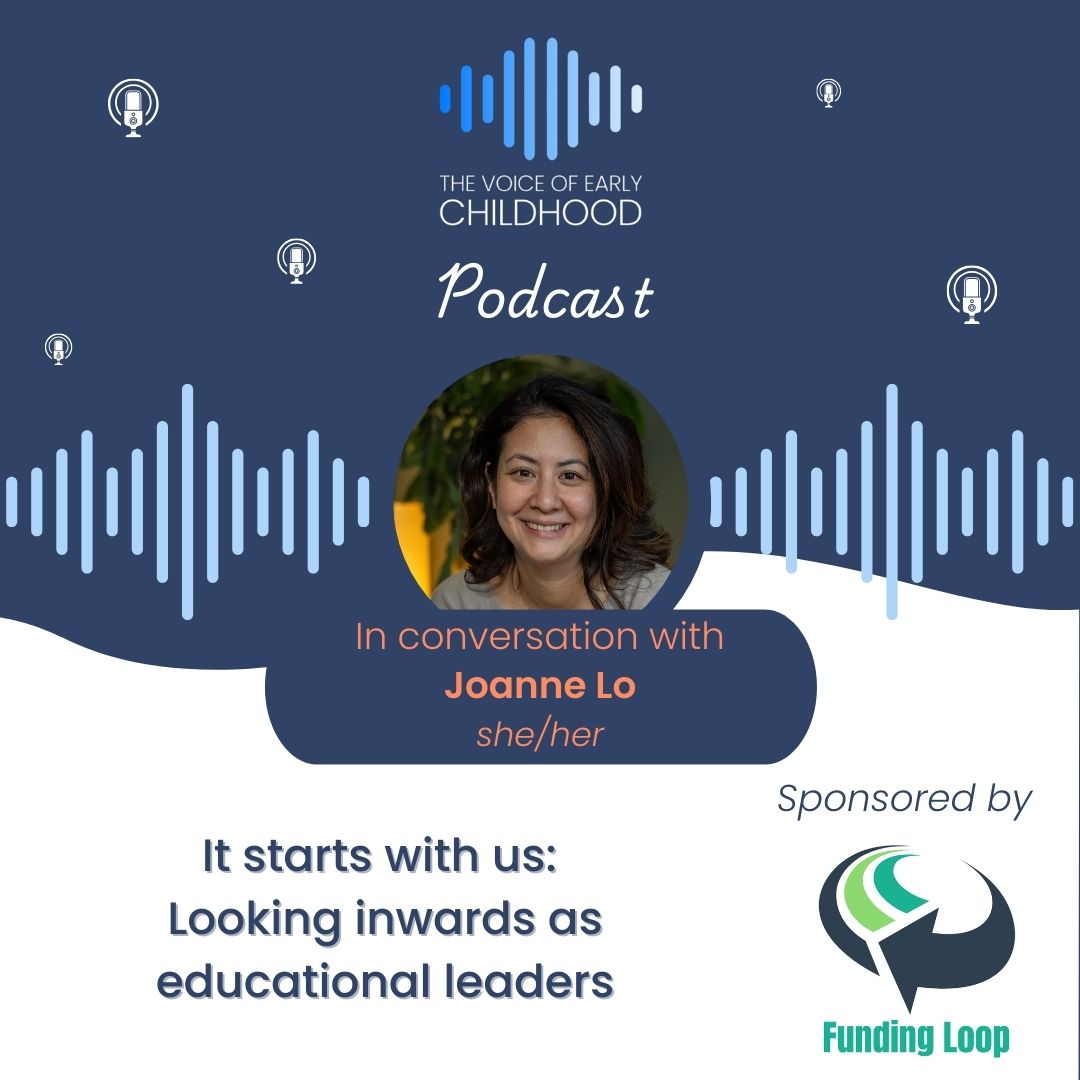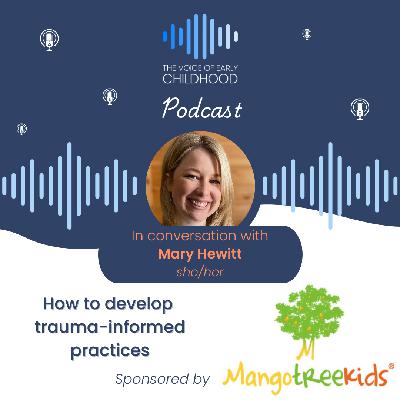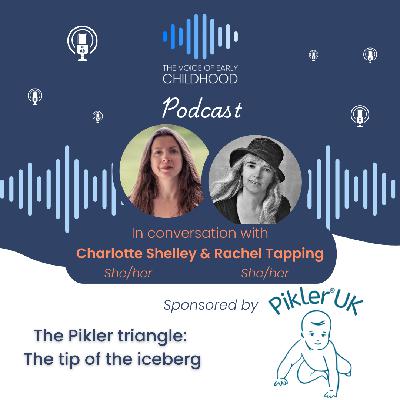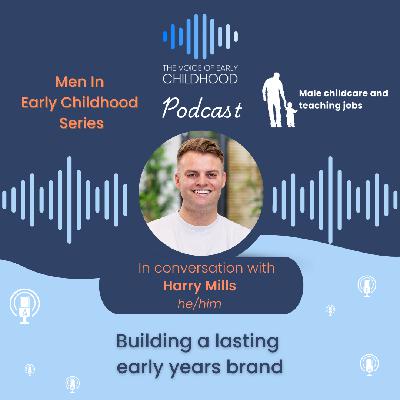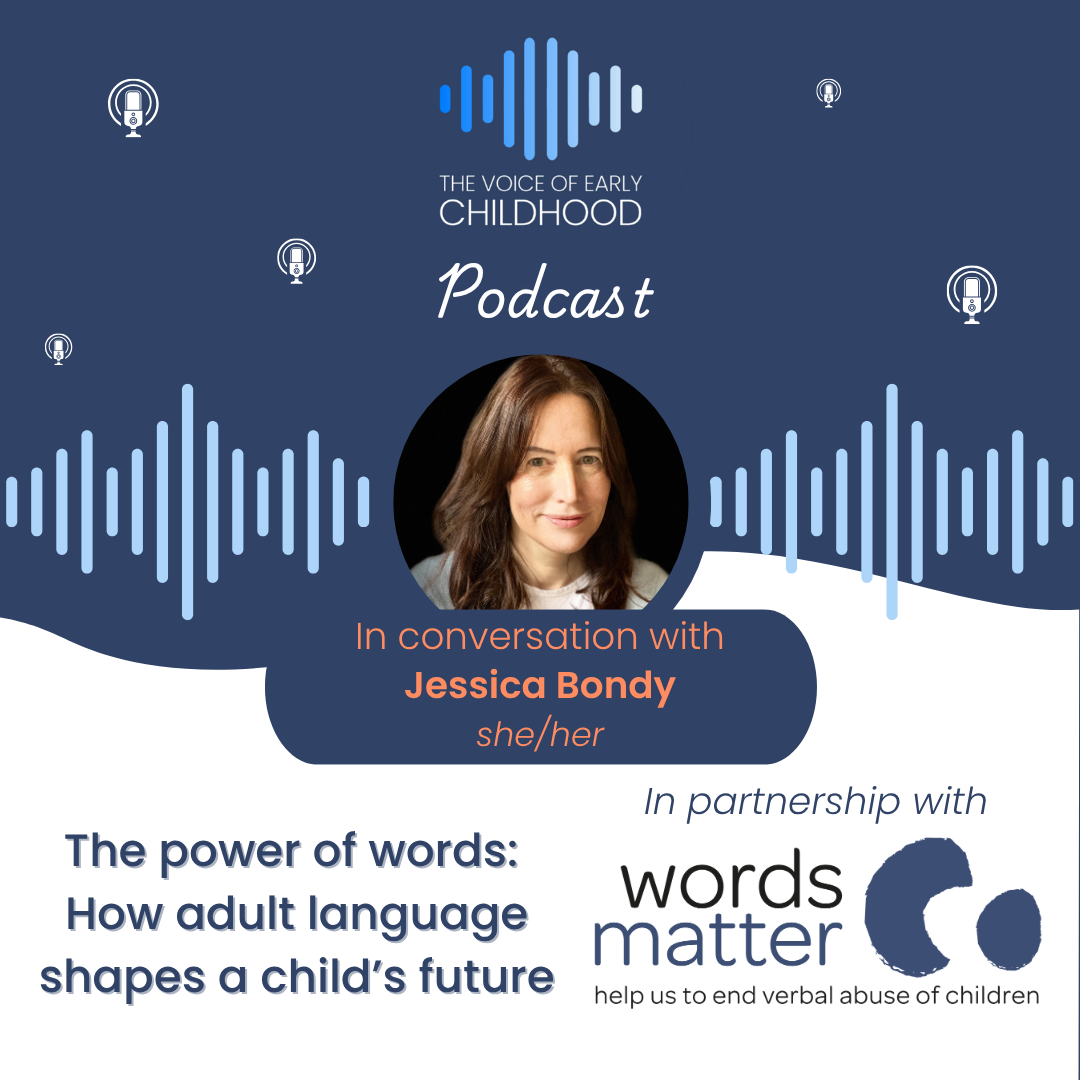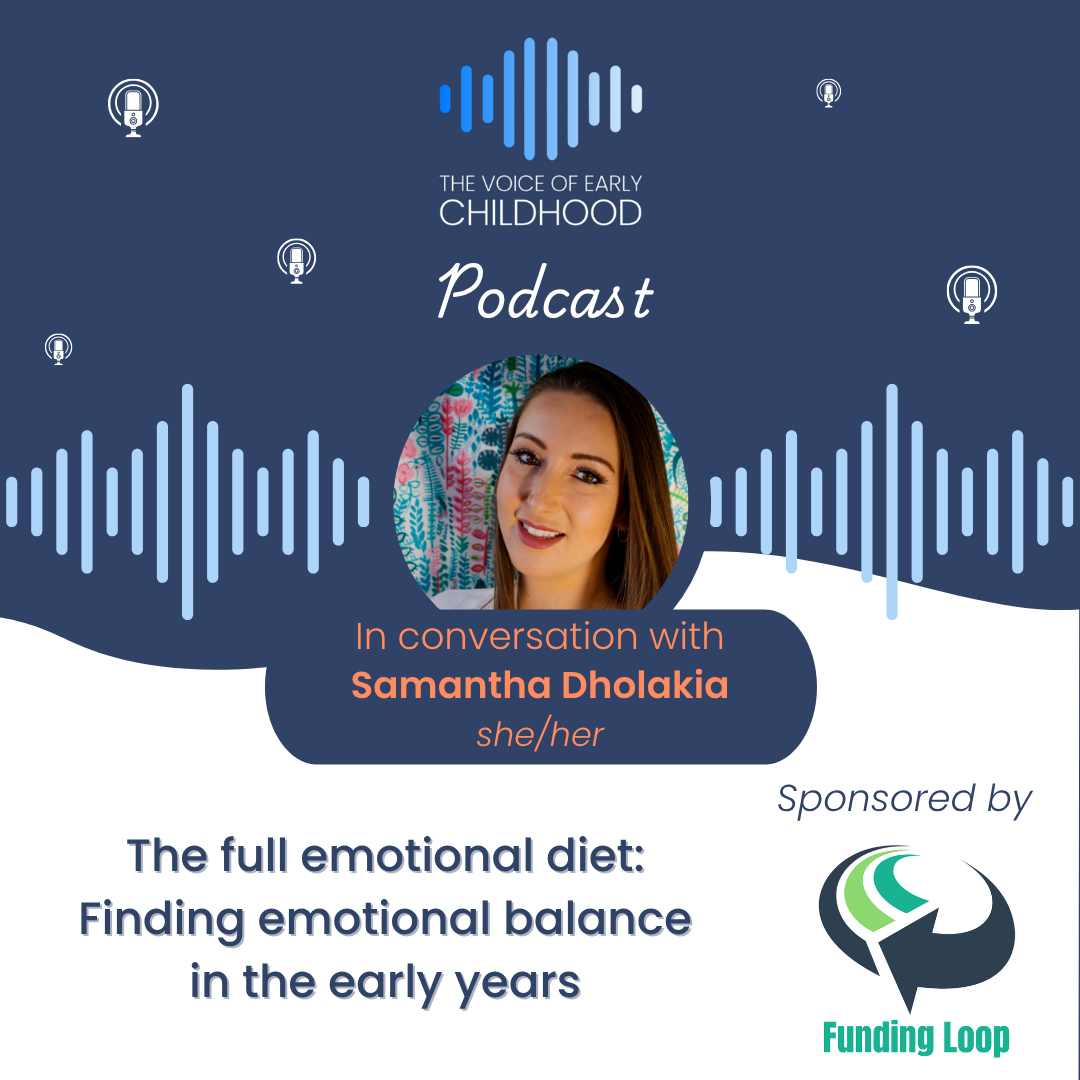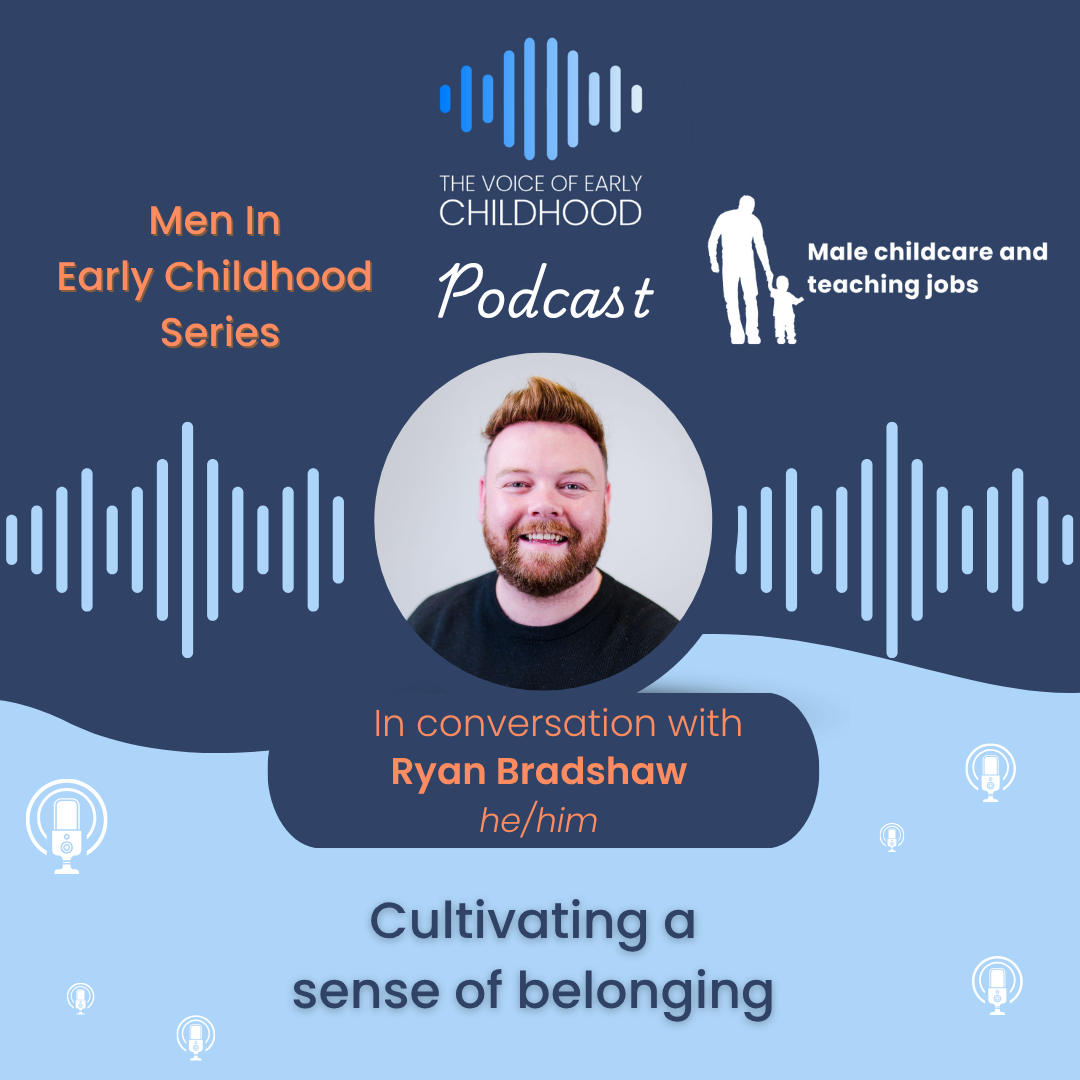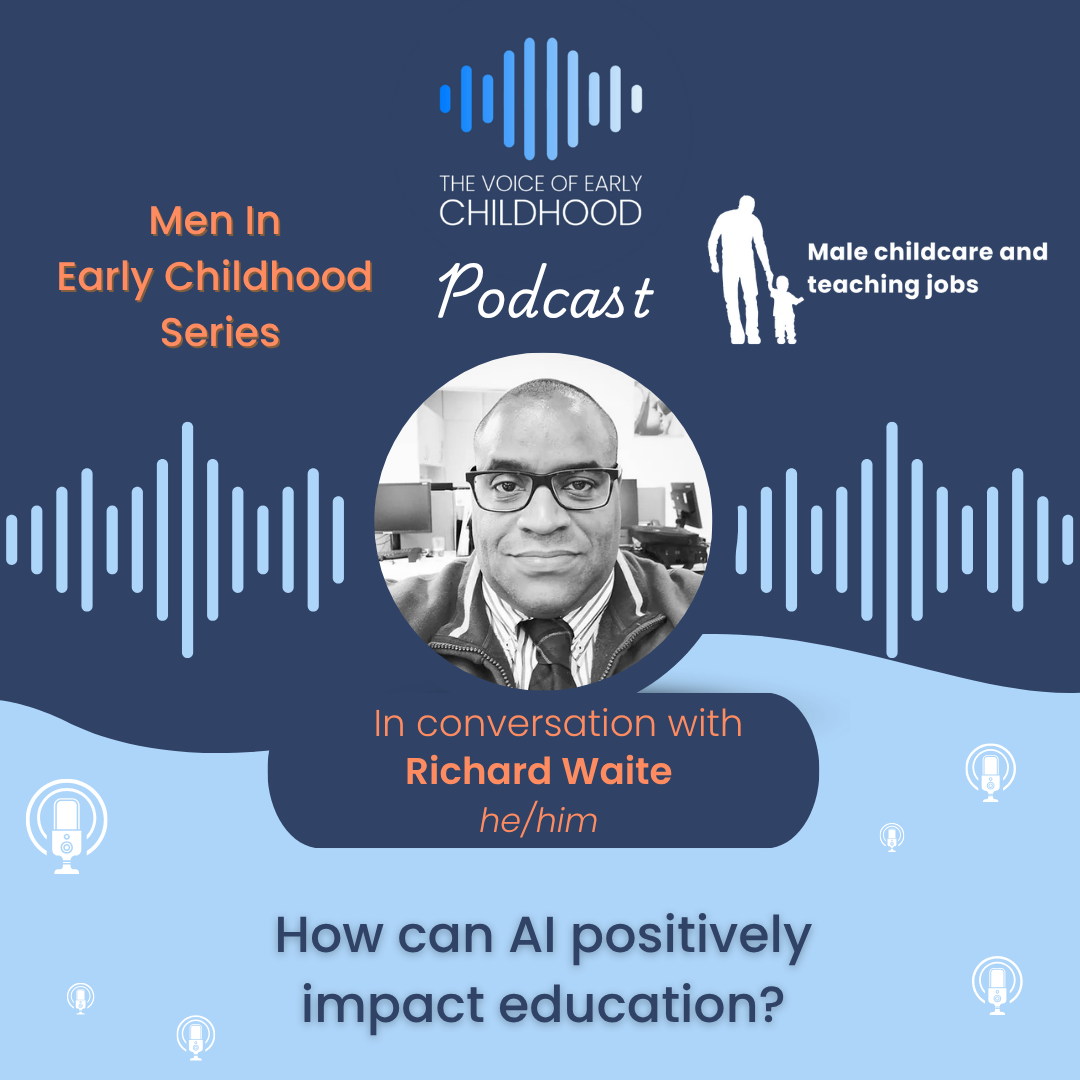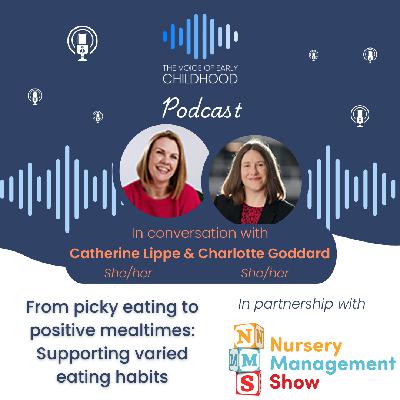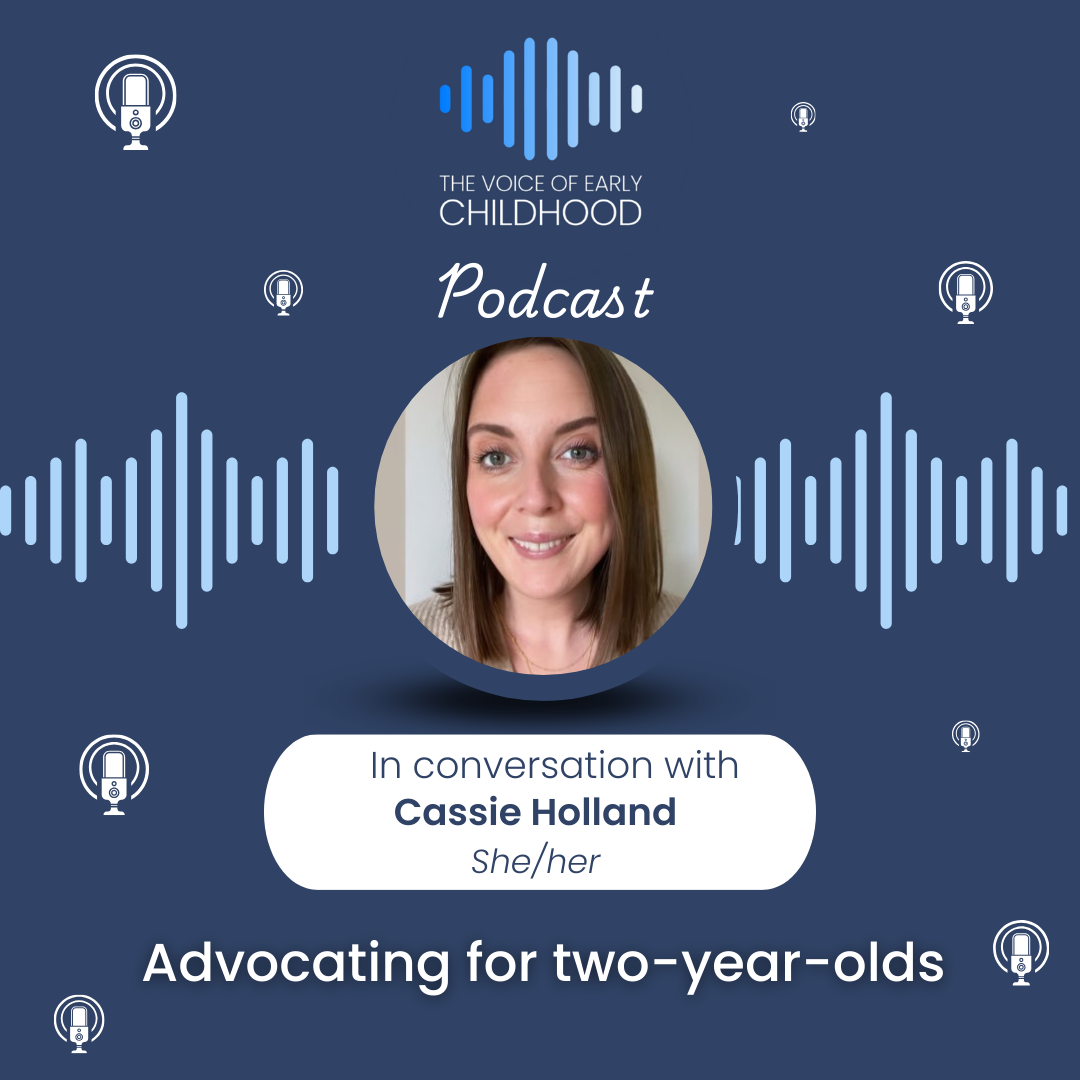Discover The Voice of Early Childhood
The Voice of Early Childhood

The Voice of Early Childhood
Author: The Voice of Early Childhood
Subscribed: 12Played: 185Subscribe
Share
Copyright © 2023 The Voice of Early Childhood
Description
The Voice of Early Childhood Podcast: involving you in thought-provoking discussions around early childhood. This weekly podcast brings you discussion, reflection, debate and a window into the minds of advocates working with our young leaders of tomorrow.
133 Episodes
Reverse
The International Baccalaureate (IB) emphasizes concept-driven inquiry. In the Primary Years Programme (PYP) learners explore broad and transferable ideas, enabling deeper thinking and application across different contexts. This powerful way of thinking and learning begins with our younger learners who inquire into the world around them and develop conceptual understanding through both educator-led experiences and play. Read Sue’s article here: https://thevoiceofearlychildhood.com/elevating-childrens-thinking-conceptual-understanding-through-inquiry-and-play/ This episode is sponsored by the International Baccalaureate: Founded in 1968, the International Baccalaureate (IB) pioneered a movement of international education and now offers four high quality, challenging educational programmes to students aged 3-19. The IB gives students distinct advantages by providing strong foundations, critical thinking skills, and proficiency for solving complex problems while encouraging multiculturalism, curiosity, and a healthy appetite for learning and excellence. In a world where asking the right questions is as important as discovering answers, the IB champions critical thinking and flexibility in study by crossing disciplinary, cultural, and national boundaries. Supported by world-class educators and coordinators, the IB currently engages with more than two million students in over 5,900 schools across 160 countries. To find out more visit: https://www.ibo.org/ Our 2026 conference info & tickets: https://thevoiceofearlychildhood.com/early-years-conference-2026/ Listen to more: If you enjoyed this episode, you might also like: · Enquiry led learning: A curious classroom by Stuart Cloke – https://thevoiceofearlychildhood.com/enquiry-led-learning-a-curious-classroom/ · What is an early years curriculum? By Jan Dubiel and Ruth Swailes – https://thevoiceofearlychildhood.com/what-is-an-early-years-curriculum/ · The Cornish Curriculum by Mandy Richardson - https://thevoiceofearlychildhood.com/the-cornish-curriculum/ Get in touch and share your voice: Do you have thoughts, questions or feedback? Get in touch here! – https://thevoiceofearlychildhood.com/contact/ Episode break down: 00:00 – Welcome! 03:00 – What is the International Baccalaureate? 04:30 – What is conceptual understanding? 09:30 – Taking a curious stance as an educator 12:00 – Looking beyond what children are doing 13:30 – Having the time for analysing observations 15:50 – Educator planned inquiries 18:50 – Learning the concept of responsibility 22:30 – Self-expression in different ways 24:30 – A responsive planning process 29:00 – Concepts or skills & facts? 31:00 – Adult extended inquiries 36:00 – Honouring children’s thinking 37:00 – Key takeaways For more episodes and articles visit The Voice of Early Childhood website: https://www.thevoiceofearlychildhood.com
This article and podcast episode challenges the conventional practice of tummy time, drawing on research from Pikler, Feldenkrais, and Goddard Blythe to argue that babies thrive when allowed to move freely and naturally. It explores how self-initiated movement supports neurological development, reflex integration, and emotional regulation—highlighting the importance of trust, observation, and respectful environments over intervention and milestone-driven practice. Read the article here: https://thevoiceofearlychildhood.com/tummy-time-is-an-outdated-notion/ This episode is sponsored by Pikler UK Pikler UK promotes the principles of the Pikler® approach: respectful care, free movement development, and self-initiated play in the early years. We offer training and resources for parents and professionals, supporting secure relationships and natural development. Rooted in the work of Dr Emmi Pikler, we nurture trust in each child’s competence from the very beginning. To find out more visit: https://pikler.co.uk/ The Pikler UK conference: https://pikler.co.uk/shop/conference-25 Listen to more: If you enjoyed this episode, you might also like: · The Pikler Triangle: The tip of the iceberg – https://thevoiceofearlychildhood.com/the-pikler-triangle-the-tip-of-the-iceberg/ · An introduction to Emmi Pikler – https://thevoiceofearlychildhood.com/introduction-emmi-pikler/ Get in touch and share your voice: Do you have thoughts, questions or feedback? Get in touch here! – https://thevoiceofearlychildhood.com/contact/ Episode break down: 00:00 – Welcome! 01:45 – Reflexes & tummy time 04:00 – School readiness linked to reflexes 06:00 – Is my child behind? 08:50 – Should we help babies to roll over? 11:00 – Building resilience through freedom of movement 13:40 – Development through loving presence 14:30 – How does it feel for the child being rushed to the next step? 18:20 – Learned helplessness 21:00 – Movement as communication & relationship building 25:00 – Containment – restrictive movement 28:00 – Issues arising from containment 30:00 – Pikler UK conference 2025: Born ready 31:20 – Challenging the notion of school readiness For more episodes and articles visit The Voice of Early Childhood website: https://www.thevoiceofearlychildhood.com
In this re-released episode and article David Meechan critically explores the reception baseline assessment (RBA), questioning its purpose, reliability and impact on children, teachers and families. Drawing on his research and personal experience, he highlights practical ways educators and leaders can navigate the RBA while advocating for assessment approaches that truly reflect and support child-centred learning in the early weeks of school. Read the article here: https://thevoiceofearlychildhood.com/whats-the-problem-with-the-reception-baseline-assessment/ Our 2026 conference info & tickets: https://thevoiceofearlychildhood.com/early-years-conference-2026/ Get in touch and share your voice: Do you have thoughts, questions or feedback? Get in touch here! – https://thevoiceofearlychildhood.com/contact/ Episode breakdown: 03:30 - How David's work started on the RBA 05:50 - Requesting his son's withdrawal from the assessment 07:55 - Inconsistencies of withdrawal from the assessment 09:30 - Moral issues with assessment and testing 11:30 - Research into the baseline assessment 14:40 - Signing away a child's data footprint 15:57 - The datafication of early years 19:00 - Are the children's best interests at heart? 20:40 - Taking teachers out of classrooms 21:58 - Key findings from David's baseline research 23:50 - Treating children as a means to an end 27:35 - Making the most of the reception baseline assessment 29:00 - A holistic approach to the baseline assessment 30:40 - Reliability of the baseline assessment 32:00 - Reducing lived experiences to abstract numbers 34:15 - Positives taken from the baseline assessment 36:00 - Giving value to assessment 40:00 - Tips for teachers conducting the baseline assessment Hear and read more on The Voice of Early Childhood website: www.thevoiceofearlychildhood.com
Reception teacher Poppy LeMar responds to Bridget Phillipson’s claim that “half can’t sit still” at age four, explaining that while children can sit briefly, their self-regulation is still developing. She highlights what sitting still actually looks like in a reception classroom, challenges misconceptions, and encourages better understanding between families and educators. She also advocates for inclusion and realistic expectations. Read the article here: https://thevoiceofearlychildhood.com/should-4-year-olds-really-be-expected-to-sit-still-?/ This episode is sponsored by Funding Loop Funding Loop automates the process for nurseries of collecting funding forms from parents and typing that information into council portals. Funding Loop is used by over 2000 nurseries including over 80% of the top 25 nursery chains in the UK including Busy Bees. To find out more visit: https://www.fundingloop.co.uk/home Our 2026 conference info & tickets: https://thevoiceofearlychildhood.com/early-years-conference-2026/ You might also like… · Proactively promoting positive mental health by Matt Bawler – https://thevoiceofearlychildhood.com/proactively-promoting-positive-mental-health/ · Self-regulation, co-regulation & mental health by Dr Mine Conkbayir – https://thevoiceofearlychildhood.com/self-regulation-co-regulation-and-mental-health/ · ‘It’s not time out, it’s time in’ for both of us: Co- and self-regulation by Julia Robinson & Charlotte Hannah – https://thevoiceofearlychildhood.com/its-not-time-out-its-time-in-for-both-of-us/ · Understanding neuroscience in early childhood by Mandy Worsley – https://thevoiceofearlychildhood.com/understanding-neuroscience-in-early-childhood/ Get in touch and share your voice: Do you have thoughts, questions or feedback? Get in touch here! – https://thevoiceofearlychildhood.com/contact/ Episode break down: 00:00 – Welcome! 01:50 – Should 4-year-olds really be expected to sit still? 04:00 – Expectations on starting school 06:30 – Safety requirements 08:00 – From sitting still to sitting safely 11:00 – Sitting still is outdated 12:30 – ‘Fidget toys’ and sensory resources 16:00 – Putting children at the back of the carpet 18:00 – Negative spaces in the classroom 21:45 – ‘Marketing’ & reframing as a teacher… 24:00 – Freedom to sit how children want 27:00 – Expectations for learning 28:00 – Engaging in deep play 30:00 – Children struggling to play 34:00 – What is your understanding of school readiness? 38:30 – Preparing your child for school 40:00 – Communication & trust is number 1 For more episodes and articles visit The Voice of Early Childhood website: https://www.thevoiceofearlychildhood.com
Screen time isn’t inherently passive — or problematic. This article and podcast episode explores the difference between active and passive screen time in early childhood, and how digital play, when used intentionally, can support critical life skills like empathy, resilience, and problem-solving. A balanced, developmental approach can help educators and caregivers make informed choices about children’s use of screens. Read the article here: https://thevoiceofearlychildhood.com/active-vs-passive-screen-time/ This episode is sponsored by Nurture Nurture is an interactive learning app designed for children aged 4–7, developed to teach essential life skills that traditional schools often overlook. Through immersive, story-driven games and a unique dual‑screen experience (mobile/tablet + TV), the platform focuses on mindfulness, emotional regulation, growth mindset, resilience, money smarts, and critical thinking. Built on a science-backed educational framework and crafted by educators, child development experts, and Emmy-winning storytellers, Nurture aims to transform screen time into purposeful play. To find out more visit: www.nurture.is Our 2026 conference info & tickets: https://thevoiceofearlychildhood.com/early-years-conference-2026/ Listen to more: If you enjoyed this episode, you might also like: · Life skills over academic achievement by Carmela Garcia Manas & Zanna Clarke - https://thevoiceofearlychildhood.com/life-skills-over-academic-achievement/ · How can AI positively impact education? By Richard Waite - https://thevoiceofearlychildhood.com/how-can-ai-positively-impact-education/ Get in touch and share your voice: Do you have thoughts, questions or feedback? Get in touch here! – https://thevoiceofearlychildhood.com/contact/ Episode break down: 00:00 – Welcome & introductions 03:30 – Screen time as a concern 05:30 – What does active screen time mean? 07:00 – Digital social environment 08:30 – Gaming as active screen time 13:00 – Musa’s role of game design and research 15:00 – Structure & habit of screen time 16:30 – Co-engagement in screen time 19:30 – Games as safe environments to take risks 21:00 – Asking children the right questions 22:00 – Are games similar to books? 24:00 – Agency and co-creation through screen time 25:00 – What is Nurture? 26:30 – Taking screen time offline & into the real world 28:45 – A balanced digital diet: Passive screen time is also valuable 30:00 – Learning consequences in safe spaces 31:00 – Co-regulation through gaming 33:25 – Eye health & screen use 35:00 – Digital wellbeing 36:00 – Digital expression & creativity (toolbox of expression) 37:00 – Tips for parents who are nervous about allowing screen time 38:00 – A digital canyon – falling behind 41:00 – Key takeaways For more episodes and articles visit The Voice of Early Childhood website: https://www.thevoiceofearlychildhood.com
This reflective piece explores how perspectives on risky play have changed over time, highlighting its importance for children’s development. Darren Barkhouse draws on personal experiences and cultural comparisons – challenging today’s risk-averse attitudes and advocates for supportive environments where children can explore, take risks, and grow. The article and podcast episode invite educators and families to reconsider their own approaches to risk in play. Read the article here: https://thevoiceofearlychildhood.com/changing-perspectives-on-risky-play/ This episode is sponsored by Funding Loop Funding Loop automates the process for nurseries of collecting funding forms from parents and typing that information into council portals. Funding Loop is used by over 2000 nurseries including over 80% of the top 25 nursery chains in the UK including Busy Bees. To find out more visit: https://www.fundingloop.co.uk/home Our 2026 conference info & tickets: https://thevoiceofearlychildhood.com/early-years-conference-2026/ Listen to more: If you enjoyed this episode, you might also like: · A nature-deficit childhood by Julia Packwood - https://thevoiceofearlychildhood.com/a-nature-deficit-childhood/ · The therapeutic nature of outdoor play by Jenny Smillie - https://thevoiceofearlychildhood.com/the-therapeutic-nature-of-outdoor-play/ · The science behind outdoor play by Dr Gemma Goldenberg - https://thevoiceofearlychildhood.com/author/gemma-goldenberg/ Get in touch and share your voice: Do you have thoughts, questions or feedback? Get in touch here! – https://thevoiceofearlychildhood.com/contact/ Episode break down: 00:00 – Welcome & introductions 04:30 – Reflecting back to early experiences of risky play 08:25 – Positive stress situations & building resiliency 13:00 – Controlled learning environments for exploration 18:00 – Teaching children to risk assess for themselves 20:00 – Less risky play or a different type of risky play? 22:00 – Asking why rather than saying no 28:00 – A cultural lens on risky play 34:00 – The power of boredom 35:00 – Control, scaffolding learning & Vygotsky 37:00 – The impacts of media and technology 43:00 – Building relationships and trust 46:00 – Your own toolbox as an educator or parent/carer For more episodes and articles visit The Voice of Early Childhood website: https://www.thevoiceofearlychildhood.com
Transitions are significant milestones in a child’s early learning journey, deeply shaping their sense of security, confidence, and readiness to engage with new experiences. Transitions to an early years setting from home and to starting school can be particularly significant periods of time for young children. In this article and podcast episode school improvement officer and director of early years, Delyth Linacre, talks to us about vital considerations for transitions to and within school, including tips for both educators and families. Read Delyth’s article here: https://thevoiceofearlychildhood.com/starting-school-supporting-transitions-to-reception-and-key-stage-1/ Download the free transition support PDF’s here: https://thevoiceofearlychildhood.com/starting-school-supporting-transitions-to-reception-and-key-stage-1/ This episode is sponsored by Funding Loop Funding Loop automates the process for nurseries of collecting funding forms from parents and typing that information into council portals. Funding Loop is used by over 2000 nurseries including over 80% of the top 25 nursery chains in the UK including Busy Bees. To find out more visit: https://www.fundingloop.co.uk/home Our 2026 conference info & tickets: https://thevoiceofearlychildhood.com/early-years-conference-2026/ Get in touch and share your voice: Do you have thoughts, questions or feedback? Get in touch here! – https://thevoiceofearlychildhood.com/contact/ Episode break down: 00:00 – Welcome! 02:00 – What are transitions 03:00 – What do transitions look like in your setting? 04:00 – Transition as a process, not an event 05:00 – A gradual and child-centred approach 06:00 – Involving all stakeholders 07:00 – The importance of effective communication 08:00 – Capturing parent and child voice 09:00 – Considering barriers to effective transitions 10:30 – Knowing each individual child 13:40 – Transition plans and building on what the child knows 14:30 – Identifying what is and needs to be the same 15:40 – Peer buddies as transition support 16:30 – Identifying early interventions 18:00 – Transitions from reception to year 1 21:30 – A transition plan spanning the whole reception year 22:00 – Focus on the similarities rather than differences 28:00 – Collaborating across settings and understanding each other’s practice 30:45 – How can parents support transitions? 37:00 – Starting reception free support document 37:45 – Books to support transitions 38:20 – Free PDF transition guidance document For more episodes and articles visit The Voice of Early Childhood website: https://www.thevoiceofearlychildhood.com
Children today are spending significantly less time outdoors than just a generation ago and this raises the question for parents and educators to consider, what are the implications of a childhood disconnected from nature? In this article and podcast episode Julia Packwood, early years outdoor specialist, highlights current research and explores how simply spending time outdoors can build the foundations for a healthier and happier childhood. Read the article here: https://thevoiceofearlychildhood.com/a-nature-deficit-childhood/ This episode is sponsored by Funding Loop Funding Loop automates the process for nurseries of collecting funding forms from parents and typing that information into council portals. Funding Loop is used by over 2000 nurseries including over 80% of the top 25 nursery chains in the UK including Busy Bees. To find out more visit: https://www.fundingloop.co.uk/home Listen to more: If you enjoyed this episode, you might also like: · The therapeutic nature of outdoor play by Jenny Smillie – https://thevoiceofearlychildhood.com/the-therapeutic-nature-of-outdoor-play/ · The science behind outdoor play series by Dr Gemma Goldenberg – https://thevoiceofearlychildhood.com/author/gemma-goldenberg/ Our 2026 conference info & tickets: https://thevoiceofearlychildhood.com/early-years-conference-2026/ Get in touch and share your voice: Do you have thoughts, questions or feedback? Get in touch here! – https://thevoiceofearlychildhood.com/contact/ Episode break down: 00:00 – Welcome! 03:45 – What is nature-deficit disorder? 07:00 – Noticeable benefits of being outdoors 09:20 – Reclaiming childhood 12:30 – Risk-benefit analysis 13:45 – What does childhood look like now? 16:55 – Less screen time, more green time 28:15 – Barefoot benefits & grounding 30:20 – Safety sweeps 34:00 – Air quality 37:20 – Conservation 43:50 – Calls to action to government and communities 50:00 – It starts with us reflecting inwards 52:00 – Further reading For more episodes and articles visit The Voice of Early Childhood website: https://www.thevoiceofearlychildhood.com
This article and podcast episode explore the benefits of covering climate change and sustainability in early years settings, for both children and staff. It also outlines England’s Department for Education’s expectations on nurseries, relating to climate change, and introduce the England’s leading environmental education programme for nurseries, ‘Eco-Schools: Early Years’. Read the article here: https://thevoiceofearlychildhood.com/how-to-take-the-first-steps-on-your-sustainability-journey/ This episode is sponsored by Keep Britain Tidy. Keep Britain Tidy is a leading independent environmental charity that works to inspire, educate and enable everyone in this country to value the environment on their doorstep. Keep Britain Tidy includes the programmes Eco-Schools, Eco-Schools: Early Years, the Green Flag Award for parks and green spaces and the Blue Flag/Seaside Awards for beaches, as well as annual campaigns. To find out more about Eco-Schools: Early Years visit: https://www.eco-schools.org.uk/early-years/ Get in touch and share your voice: Do you have thoughts, questions or feedback? Get in touch here! – https://thevoiceofearlychildhood.com/contact/ Episode break down: 00:00 – Welcome! 02:00 – Children are perfect climate ambassadors 03:20 – Sustainability eco leads 05:40 – Eco-Schools: Early Years 09:30 – Educating the staff and using model nurseries 10:30 – Eco-challenges 12:00 – Involving families 14:45 – Government guidance 17:30 – Climate action plan is a journey 18:00 – Carbon calculator 19:00 – Getting the whole team on board 20:20 – Combatting eco-anxiety 23:00 – Tools to address climate change early 24:00 – Equipping children with language around sustainability 26:00 – Understanding sustainability as part of routines 28:00 – Eco-Schools: Early Years going beyond the EYFS 30:00 – Applications now open for Eco-Schools: Early Years For more episodes and articles visit The Voice of Early Childhood website: https://www.thevoiceofearlychildhood.com
Education consultant Joanne Lo explores how self-reflection and personal wellbeing are essential foundations for effective leadership in schools and early years settings. Drawing on mindfulness and social-emotional learning, she shares practical strategies for fostering resilience, building supportive cultures, and modelling wellbeing as an educational leader. Read Joanne’s article here: https://thevoiceofearlychildhood.com/it-starts-with-us-looking-inwards-as-educational-leaders/ This episode is sponsored by Funding Loop Funding Loop automates the process for nurseries of collecting funding forms from parents and typing that information into council portals. Funding Loop is used by over 2000 nurseries including over 80% of the top 25 nursery chains in the UK including Busy Bees. To find out more visit: https://www.fundingloop.co.uk/home Our 2026 conference info & tickets: https://thevoiceofearlychildhood.com/early-years-conference-2026/ Listen to more: If you enjoyed this episode, you might also like: · Accidental leadership in early years by Jenny Weidner: https://thevoiceofearlychildhood.com/accidental-leadership-in-early-years/ · My experience of burnout as a Black manager by Lorraine Kara: https://thevoiceofearlychildhood.com/my-experience-with-burnout-as-a-black-manager/ · Supporting employee wellbeing by Enya Last: https://thevoiceofearlychildhood.com/supporting-employee-wellbeing/ Get in touch and share your voice: Do you have thoughts, questions or feedback? Get in touch here! – https://thevoiceofearlychildhood.com/contact/ Episode break down: 00:00 – Introductions 03:00 – Invisible pressures carried by leaders 03:45 – Non-verbal communication 04:30 – Normalising every single emotion 09:00 – Giving yourself permission to just ‘be’ 10:00 – Noticing how your emotions affect your body 12:00 – Setting goals for the week or day ahead, then reflect 14:00 – Stress-ees becoming stress-ors! 15:00 – Having a sunny disposition 16:30 – Using language that serves you, language of kindness 17:20 – Zone of control 19:00 – Children emotionally checking in with themselves 21:00 – Creating a safe space to just ‘be’ 23:00 – Reflective practices 24:00 – Checking in with your team 25:30 – How do we ‘sell’ this to our teams? 26:20 – Flattening the hierarchy & tuning into passions 27:00 – Connecting with each team member 28:00 – Toxic vs positive culture examples 29:00 – Creating a climate of belonging 31:00 – What are we doing that isn’t supporting our teams? 33:00 – Understanding different cultural contexts 33:45 – Observing your teams as well as children 35:00 – Seeking to understand before judging 35:50 – Body language stats! 38:45 – As a leader you are developing people 40:00 – There’s always a way to handle stress & difficult conversations 40:25 – When you’re in charge you often neglect yourself 42:00 – 2-minute check-ins 42:45 – You can choose to be toxic or positive 44:00 – Shifting from how we were, to how we will be 44:45 – Building relational trust 45:20 – Equipping our feelings with vocabulary 46:30 – Joanne’s childhood & professional journey 53:00 – Children’s summer camps 54:00 – Asking for permission to help & allowing time 59:00 – Episode reflections 01:00:00 – Enquire about working with Joanne For more episodes and articles visit The Voice of Early Childhood website: https://www.thevoiceofearlychildhood.com
Childhood trauma, often referred to as ‘complex’ or ‘developmental’ trauma, is extremely common but is not often discussed in the context of our work as early childhood educators. And yet, children are showing up to our settings/programs every day carrying the weight of these circumstances and, according to research, a trajectory of negative health outcomes for the lifespan as a result. But Mary Hewitt shares with us that there is hope: early positive relationships and experiences with informed educators have the power to protect, buffer, and even reverse the devastating impacts of childhood trauma. This episode is sponsored by Mangotree Kids. Mangotree Kids provides African drumming programs and inclusive toys and educational resources which promote the beauty of culture. Our main focus is enhancing the quality and diversity of products that represent Black children, ensuring they see themselves and their culture reflected in the toys they play with. Our Jolly Djembe Club workshop introduces nursery children to the art of Djembe drumming in a fun and engaging way, and promotes wellbeing through our Rhythmic Meditation exercise. The program ends with a wonderful parents showcase. Mangotree Kids also provides a stress relief program called Beat the Stress for nursery staff. To find out more visit: https://www.mangotreekids.com/ Read Mary’s article here: https://thevoiceofearlychildhood.com/understanding-the-impact-of-childhood-trauma-and-how-to-develop-trauma-informed-practices/ Our 2026 conference info & tickets: https://thevoiceofearlychildhood.com/early-years-conference-2026/ You might also like… - Proactively promoting positive mental health by Matt Bawler – https://thevoiceofearlychildhood.com/proactively-promoting-positive-mental-health/ - Self-regulation, co-regulation & mental health by Dr Mine Conkbayir – https://thevoiceofearlychildhood.com/self-regulation-co-regulation-and-mental-health/ - ‘It’s not time out, it’s time in’ for both of us: Co- and self-regulation by Julia Robinson & Charlotte Hannah – https://thevoiceofearlychildhood.com/its-not-time-out-its-time-in-for-both-of-us/ - Understanding neuroscience in early childhood by Mandy Worsley – https://thevoiceofearlychildhood.com/understanding-neuroscience-in-early-childhood/ Share your voice: Do you have a topic or guest you would like to hear on the podcast? Get in touch here! – https://thevoiceofearlychildhood.com/contact/ Episode break down: 00:00 – Welcome! 03:00 – Topic warning – A difficult conversation 03:45 – What is trauma? 07:30 – How do traumas show up as behaviours? 08:40 – Trading connection for protection 10:00 – Dissociation – Shutting down & disconnecting 11:20 – Arousal response – Fight or flight mode, aggressive state & confrontation 12:45 – Examples of traumatic experiences 17:00 – Adverse childhood experiences (ACEs) research 21:00 – Effects of trauma on the body and brain 22:00 – Survival brain taking over – Stress response is maladaptive 24:00 – Mary’s personal ACEs story 26:00 – Positive childhood experiences (PCEs) 31:00 – Elevated stress response – Living in high alert 36:00 – Floodlight approach 39:00 – Educators as agents of protection and buffers 42:00 – Rhythm and heartbeat – First sign of safety 43:30 – Drumming as co-regulation & eliciting a sense of safety 47:00 – Music & movement to elicit PCEs 48:30 – Rhythm of your day – A sense of safety 50:00 – Side by side rather than face to face 52:00 – Stage-like approach to regulation 55:00 – Removing the shame & therefore resistance 01:00:00 – ‘Little big moments’ 01:02:00 – Feeling seen, heard & that you matter 01:04:00 – The lasting impact educators have on children 01:07:00 – Further reading 01:09:30 – Key takeaways & related podcast episodes For more episodes and articles visit The Voice of Early Childhood website: https://www.thevoiceofearlychildhood.com
When most people hear the term Pikler their thoughts go to the Pikler triangle, a piece of equipment designed for climbing. When used appropriately this opens up opportunities for the very young to explore the edges of their physicality. The Pikler triangle could also be seen as a metaphor for the opportunities the Pikler approach provides to the relationship between children, their physical development and play – which this podcast episode and article delve into. Read Charlotte’s and Rachel’s article here: https://thevoiceofearlychildhood.com/the-pikler-triangle-the-tip-of-the-iceberg/ This episode is sponsored by Pikler UK Pikler UK promotes the principles of the Pikler® approach: respectful care, free movement development, and self-initiated play in the early years. We offer training and resources for parents and professionals, supporting secure relationships and natural development. Rooted in the work of Dr Emmi Pikler, we nurture trust in each child’s competence from the very beginning. To find out more visit: https://pikler.co.uk/ Pikler UK conference: https://pikler.co.uk/events Read more: An introduction to Emmi Pikler – https://thevoiceofearlychildhood.com/introduction-emmi-pikler/ Get in touch and share your voice: Do you have thoughts, questions or feedback? Get in touch here! – https://thevoiceofearlychildhood.com/contact/ Episode break down: 00:00 – Welcome! 02:00 – What is the Pikler approach? 06:00 – The Pikler triangle: A deeper meaning 10:00 – School readiness & an overly hurried approach 12:00 – What can your child ALREADY do? 15:00 – The specific design of the Pikler triangle 18:00 – Independence, risk taking & autonomy 22:15 – Teaching for the future 24:00 – Careful observation for risky play & challenge 30:00 – The attitude of the adult 38:00 – Reducing judgement & supporting intrinsic motivation 41:00 – Self-esteem, confidence & ‘readiness’ 43:45 – Pikler UK conference 46:45 – Is tummy time good for children? – Episode coming soon 48:00 – Read more on Emmi Pikler & the Pikler triangle For more episodes and articles visit The Voice of Early Childhood website: https://www.thevoiceofearlychildhood.com
Do you want to know how to build a sustainable and successful early years brand to underpin your early years business? From sector insights to interesting case studies and practical advice – this article and podcast episode are a great point of reference for those who are starting out as well as those long-established providers who are looking to stand the test of time. Read Harry’s article here: https://thevoiceofearlychildhood.com/building-a-lasting-early-years-brand/ This episode is in partnership with Male Childcare and Teaching Jobs. Male Childcare and Teaching Jobs advocate for greater male participation in education and caregiving roles, offering support and guidance to enhance gender inclusion in nurseries and schools. To find out more visit: https://malechildcareandteachingjobs.co.uk/ Listen to more: If you enjoyed this episode, you might also like some of our other business focused episodes: · Navigating the realities of business ownership in the early years – Dr Jane Todd – https://thevoiceofearlychildhood.com/navigating-the-realities-of-business-ownership-in-the-early-years-sector/ · Accidental leadership in early years – Jenny Weidner – https://thevoiceofearlychildhood.com/accidental-leadership-in-early-years/ Plus hear and read more on men in early childhood: https://thevoiceofearlychildhood.com/articles/men-in-early-childhood/ Get in touch and share your voice: Do you have thoughts, questions or feedback? Get in touch here! – https://thevoiceofearlychildhood.com/contact/ Episode break down: 00:00 – Welcome! 03:30 – The difference between a business and a brand 08:00 – Being a trustworthy brand 12:30 – Transparency and brand buy in 22:00 – Brand and recruitment 24:30 – A brand that appeals across generations 26:00 – Tips for sharing your brand 26:45 – Employee generated content 28:00 – Structuring your business adverts 34:30 – Consistency, time and investment are key 36:00 – Brand longevity and corporate branding For more episodes and articles visit The Voice of Early Childhood website: https://www.thevoiceofearlychildhood.com
Words hold a lot of power for children, they shape who they are and who they become. Yet 41% of children experience verbal abuse by adults, which can lead to lasting damage. Jessica Bondy, founder of Words Matter, discusses how by using positive, encouraging language we can build a child’s confidence and help them flourish. Let’s build children up with our words, not knock them down. Words matter. Read Jessica’s article here: https://thevoiceofearlychildhood.com/the-power-of-words-how-adult-language-shapes-a-childs-future/ This episode is in partnership with Words Matter: At Words Matter, we are committed to creating societal and behavioural change by addressing and ending childhood verbal abuse. We know that most adults don’t intend to harm children with their words - but many underestimate the lasting impact they can have. Help us inspire action and make a difference to children’s lives today and for years to come. Visit www.wordsmatter.org for support, guidance, and resources to help create a world where children hear the words that build them up – not knock them down. Listen to more: If you enjoyed this episode, you might also like: · Proactively promoting positive mental health – Matt Bawler – https://thevoiceofearlychildhood.com/proactively-promoting-positive-mental-health/ · Growth mindset in early childhood – Matt Bawler – https://thevoiceofearlychildhood.com/growth-mindset-in-early-childhood-2/ · Supporting behaviour: Reaction vs response – Cheryl Warren – https://thevoiceofearlychildhood.com/supporting-behaviour-reaction-vs-response/ Get in touch and share your voice: Do you have thoughts, questions or feedback? Get in touch here! – https://thevoiceofearlychildhood.com/contact/ Episode break down: 00:00 – Welcome! 02:00 – Ending verbal abuse of children by adults 05:00 – What do you want your legacy to be? 08:00 – The power of reaching out & collaboration 10:00 – Research into child verbal abuse 11:30 – Unintentional abuse with huge impacts 14:00 – Top 5 most hurtful phrases 15:00 – The most helpful phrases: Growth mindset 17:00 – 5 ways of supporting children through our language 20:00 – Not criticising the person but the behaviour 21:40 – The power of the pause 22:20 – Repair: It is never too late to put things right 24:00 – Breaking the cycle of abusive language 29:00 – Triggers from childhood 33:00 – Self-protection & fight or flight 35:00 – Children remember how adults label them 36:00 – Supporting children with neurodivergence 39:00 – Verbal abuse is not just about shouting 39:45 – Reflections to takeaway & further resources For more episodes and articles visit The Voice of Early Childhood website: https://www.thevoiceofearlychildhood.com
We do not need a 'free from' diet when it comes to providing young children with emotional wellbeing and support. In the early years children need a safe space to experience, articulate, and process emotions – there is no such thing as a 'bad emotion'; they all have their role to play. Behaviour and emotional regulation coach Samantha Dholakia talks us through why children need the full ‘emotional diet’. Read Samantha’s article here: https://thevoiceofearlychildhood.com/the-full-emotional-diet-finding-emotional-balance-in-the-early-years/ This episode is sponsored by Funding Loop: Funding Loop automates the process for nurseries of collecting funding forms from parents and typing that information into council portals. Funding Loop is used by over 2000 nurseries including over 80% of the top 25 nursery chains in the UK including Busy Bees. To find out more visit: https://www.fundingloop.co.uk/home Episode break down: 00:00 – Welcome! 02:50 – We focus too much on calming children down 05:00 – Each emotion has a different job 08:00 – Let’s unpick the anger, rather than saying ‘don’t be angry’ 11:45 – Teaching children about their brain, emotions and THEN behaviour 13:45 – Allowing children to feel their own emotions 18:00 – Having language to understand and describe the emotion 22:30 – Are we projecting our own dysregulation on children? 26:45 – Up and down-regulation: Both are vital 29:00 – Is this emotion helping you right now? 32:00 – Having conversations about emotions with children 33:00 – We don’t usually experience one emotion at a time 35:00 – Energetic behaviour is actually useful before bed 37:00 – Matching energy is useful (not matching emotion) 39:00 – Meeting children where they are at 39:45 – Disengagement – sometimes you need to lean into this 41:00 – We don’t just run out of energy, we can generate energy too 40:00 – Emotionally refuelling 43:00 – Getting to an active state of learning 46:00 – Further reading and listening material 48:00 – Wider societal implications of this work If you enjoyed this episode and would like to listen to more, take a look at the following episodes: Samantha’s previous episode – Should we punish and reward children’s behaviour – https://thevoiceofearlychildhood.com/should-we-punish-and-reward-childrens-behaviour/ Mandy Worsley – Understanding neuroscience in early childhood – https://thevoiceofearlychildhood.com/understanding-neuroscience-in-early-childhood/ Matt Bawler – Proactively promoting positive mental health – https://thevoiceofearlychildhood.com/proactively-promoting-positive-mental-health/ The Durham research project episode with Jill Jones and Rebecca Martin on Supporting regulation in the early years: A progressive approach – https://thevoiceofearlychildhood.com/supporting-regulation-in-the-early-years-a-progressive-approach/ For more episodes and articles visit The Voice of Early Childhood website: https://www.thevoiceofearlychildhood.com
Ryan Bradshaw emphasises the importance of fostering a sense of belonging in early childhood education. He shares his personal journey and experiences, highlighting the impact of belonging for both children and educators. Ryan advocates for greater male representation in the early years sector and discusses ways in which professionals can cultivate connection, belonging and promote diversity. Read Ryan’s article here: https://thevoiceofearlychildhood.com/cultivating-a-sense-of-belonging/ This episode is in partnership with Male Childcare and Teaching Jobs. Male Childcare and Teaching Jobs advocate for greater male participation in education and caregiving roles, offering support and guidance to enhance gender inclusion in nurseries and schools. To find out more visit: https://malechildcareandteachingjobs.co.uk/ Listen to more: If you enjoyed this episode, you might also like: What is it like being a man in early years? – Kevin Nelson https://thevoiceofearlychildhood.com/what-is-it-like-being-a-man-in-early-childhood/ Exploring career challenges for male educators in early childhood – Mattie Paul Winfield https://thevoiceofearlychildhood.com/exploring-career-challenges-for-male-educators-in-early-childhood/ Plus hear and read more on men in early childhood: https://thevoiceofearlychildhood.com/articles/men-in-early-childhood/ Get in touch and share your voice: Do you have thoughts, questions or feedback? Get in touch here! – https://thevoiceofearlychildhood.com/contact/ Episode break down: 00:00 – Welcome! 02:30 – A sense of belonging for adults 08:30 – Psychological safety 10:30 – Finding who you are as a person 13:00 – Fear of rejection 14:30 – A world without labels 16:00 – It’s ok not to fit into a space 15:00 – Children feeling psychologically safe 20:00 – Giving freedom to children with SEND 23:00 – Feeling seen and heard 26:00 – Fostering connection 29:00 – Leaders feeling safety and belonging 34:00 – Create your own space to belong 34:30 – We don’t just teach we transform For more episodes and articles visit The Voice of Early Childhood website: https://www.thevoiceofearlychildhood.com
In this episode… Mandy Richardson, owner of Naturally Learning nurseries in Cornwall, talks to us about how she created the Cornish Curriculum with her team. Mandy shares with us the details of her curriculum and some challenges along the way, including challenging Ofsted, practicalities of an outdoor nursery, defining what school readiness means to you, the ‘Cornish Connection’, teaching diversity in a ‘non-diverse’ area, authentic cultural representation and more… Read Mandy’s article here: https://thevoiceofearlychildhood.com/the-cornish-curriculum/ This episode is sponsored by Funding Loop: Funding Loop automates the process for nurseries of collecting funding forms from parents and typing that information into council portals. Funding Loop is used by over 2000 nurseries including over 80% of the top 25 nursery chains in the UK including Busy Bees. To find out more visit: https://www.fundingloop.co.uk/home Listen to more: If you enjoyed this episode, you might also like: · Early years curriculum: Provision for 2-year-olds – Charlotte Norman: https://thevoiceofearlychildhood.com/early-years-curriculum-provision-for-2-year-olds/ · It’s not really about dinosaurs: What are children learning from your curriculum – Jan Dubiel: https://thevoiceofearlychildhood.com/early-years-curriculum/ · What is an early years curriculum? Ruth Swailes & Jan Dubiel: https://thevoiceofearlychildhood.com/what-is-an-early-years-curriculum/ · Enquiry led learning: A curious classroom – Stuart Cloke: https://thevoiceofearlychildhood.com/enquiry-led-learning-a-curious-classroom/ · Education Durham curriculum project: https://thevoiceofearlychildhood.com/projects/education-durham-project/ · Early years curriculum: Building sequences of learning – Paige Hutchinson: https://thevoiceofearlychildhood.com/early-years-curriculum-building-sequences-of-learning/ · Early years curriculum: Building sequences of learning – Paige Hutchinson: https://thevoiceofearlychildhood.com/early-years-curriculum-building-sequences-of-learning/ Get in touch and share your voice: Do you have thoughts, questions or feedback? Get in touch here! – https://thevoiceofearlychildhood.com/contact/ Episode break down: 00:00 – Welcome! 02:00 – Naturally Learning settings in Cornwall 03:55 – The ‘Cornish Connection’ 06:00 – Challenging Ofsted 07:45 – Where do we begin when structuring a curriculum? 10:00 – Inspiration from the Fibonacci sequence 12:00 – The 7 areas of the Cornish Curriculum 14:00 – What does school readiness mean to you? 16:00 – How can we be diverse in a ‘non-diverse’ area? 18:00 – Authentic cultural representation 21:00 – Building the foundations of respect & curiosity 22:40 – Pedagogy or curriculum? 28:00 – Skills vs knowledge 31:00 – Practicalities of an outdoor nursery 32:50 – Risk assessing with children 35:00 – Risks that have been assessed For more episodes and articles visit The Voice of Early Childhood website: https://www.thevoiceofearlychildhood.com
Artificial Intelligence (AI) has the potential to revolutionise various sectors, including early childhood education. This podcast episode and article explore how AI can positively impact nurseries, schools and wider early education. Key discussion points include: · The role of AI in its current form and the future of AI. · AI guiding us and informing our practice, rather than doing all the work for us. · Both educators and children becoming more digitally attuned. · Understanding how AI can support our own human intelligence. Read Richard’s article here: https://thevoiceofearlychildhood.com/how-can-ai-positively-impact-education/ This episode is in partnership with Male Childcare and Teaching Jobs. Male Childcare and Teaching Jobs advocate for greater male participation in education and caregiving roles, offering support and guidance to enhance gender inclusion in nurseries and schools. To find out more visit: https://malechildcareandteachingjobs.co.uk/ Listen to more: If you enjoyed this episode, you might also like: · Promoting STEAM in early years: It’s easier than you think! – Paula Walshe https://thevoiceofearlychildhood.com/promoting-steam-in-early-years-its-easier-than-you-think/ · Infant sleep and the role of technology in parenting – Ryan White https://thevoiceofearlychildhood.com/infant-sleep-and-the-role-of-technology-in-parenting/ · Using artificial intelligence in early years – Joshua Barr https://thevoiceofearlychildhood.com/using-artificial-intelligence-in-early-years/ Plus hear and read more on men in early childhood: https://thevoiceofearlychildhood.com/articles/men-in-early-childhood/ Get in touch and share your voice: Do you have thoughts, questions or feedback? Get in touch here! – https://thevoiceofearlychildhood.com/contact/ Episode break down: 00:00 – Topic introduction 02:30 – Who is Richard Waite? 06:20 – So what actually is AI? 08:00 – The fear factor in AI 10:20 – Using AI as a tool for admin 12:40 – Supporting children with specific needs 14:30 – Let AI guide you, not replace you 17:20 – Human intelligence and artificial intelligence 22:60 – AI hallucinating & human error 24:50 – Challenges around embracing AI 29:30 – Preparing children for the future 34:20 – How can AI help you? For more episodes and articles visit The Voice of Early Childhood website: https://www.thevoiceofearlychildhood.com
This episode is in partnership with Nursery Management Show: Nursery Management Show is the largest show dedicated to nursery management and leadership. Join us on the 27th June 2025 for one day of insightful content, discussion and networking for the early years sector, plus access to industry leaders, suppliers and providers. Find out more here: https://nurserymanagementshow.co.uk/tickets?utm_campaign=56071396-Nursery%20Management%20Show%20Birmingham%202025&utm_source=voice-of-early-childhood In this episode… Registered nutritionist Catherine Lippe and early years writer Charlotte Goddard look at what drives fussy eating, and give practical strategies on how to support children to try new foods without pressure. Read Charlotte’s and Catherine’s article here: https://thevoiceofearlychildhood.com/from-picky-eating-to-positive-mealtimes-supporting-varied-eating-habits/ Get in touch and share your voice: Do you have thoughts, questions or feedback? Get in touch here! – https://thevoiceofearlychildhood.com/contact/ Episode break down: 00:00 – Welcome! 02:00 – New nutrition guidance document 06:40 – Fussy eating and food refusal 09:45 – Eating is a highly sensory & emotive process 11:00 – Food neophobia 13:00 – Accepted and non-accepted foods 15:00 – Food refusal is not your fault 17:10 – Responsive feeding vs controlling feeding 22:20 – Rolling snack & self-serving 24:45 – So should we scrap set meal times? 29:50 – Responding to emotional cues and signals 32:00 – Allow children to self-regulate their appetite 33:20 – Supporting children to try new foods 36:00 – Getting parents involved 36:35 – Equipping children with vocabulary around food 39:40 – Treats, puddings, sweet after savoury… 43:20 – Using food as a reward 47:00 – Leave your feelings about food at the door 48:30 – Keep language around food factual rather than emotional 52:00 – More on nutrition at the Nursery Management Show 54:35 – Article on nutrition for young children For more episodes and articles visit The Voice of Early Childhood website: https://www.thevoiceofearlychildhood.com
More school-based nursery provision has been initiated within schools as part of the UK Government’s focus on early years. In this podcast episode we discuss concerns around school-based nurseries, mindful care, respectful sleep spaces, ethical pedagogy, Schoolification, knowledgeable adults, nurturing and collaborative approaches… We also ask the pertinent questions: - Are schools ready for two-year-olds? - How can we collaborate to best support two-year-olds in any setting? - Are we aware of our own moral stances and consider ethical practices? - Where IS the best place for two-year-olds? Read Cassie’s article here: https://thevoiceofearlychildhood.com/advocating-for-two-year-olds Download the free guides: ‘Ready for twos’ and ‘All about twos’ – https://thevoiceofearlychildhood.com/advocating-for-two-year-olds-guides/ If you enjoyed this episode, you might also like: Early years curriculum: Provision for two-year-olds by Charlotte Norman: https://thevoiceofearlychildhood.com/early-years-curriculum-provision-for-2-year-olds/ Get in touch and share your thoughts: Do you have thoughts, questions or feedback? Get in touch here! – https://thevoiceofearlychildhood.com/contact/ Episode break down: 00:00 – Welcome! 02:20 – Why is there currently a big focus on two-year-olds? 05:50 – The ‘schoolification’ of early years 07:20 – Is it appropriate for two-year-olds to be in schools? 10:10 – How can schools be ready for two-year-olds? 16:00 – A nurturing and collaborative approach 20:30 – Risks of becoming a fragmented sector 21:30 – Local networks and Stronger Practice Hubs 26:00 – The importance of ‘thinking time’ and slowing down 27:00 – Reaching out to local settings and arranging visits 36:00 – Ethical practice and political advocacy 38:45 – Episode summary 39:50 – Free downloadable guides on working with two-year-olds 40:50 – Provision for two-year-olds project: Further listening/reading For more episodes and articles visit The Voice of Early Childhood website: https://www.thevoiceofearlychildhood.com
Comments
 United States
United States

